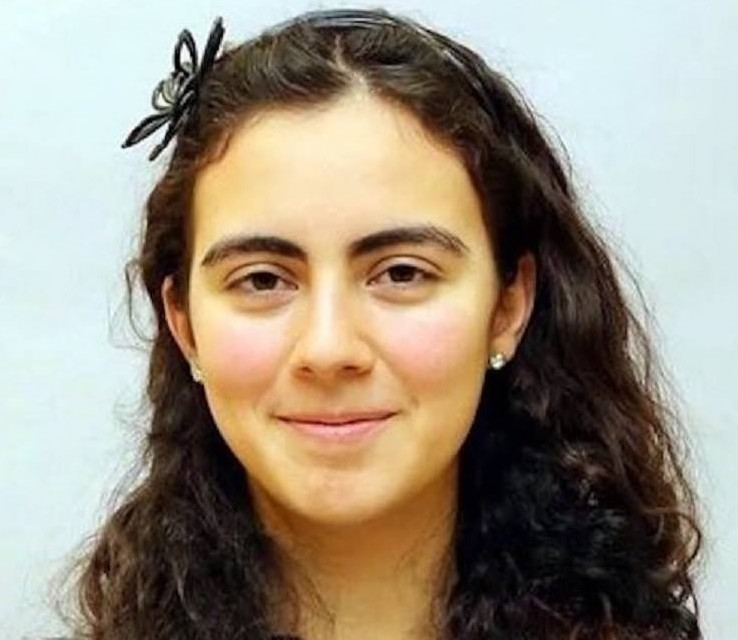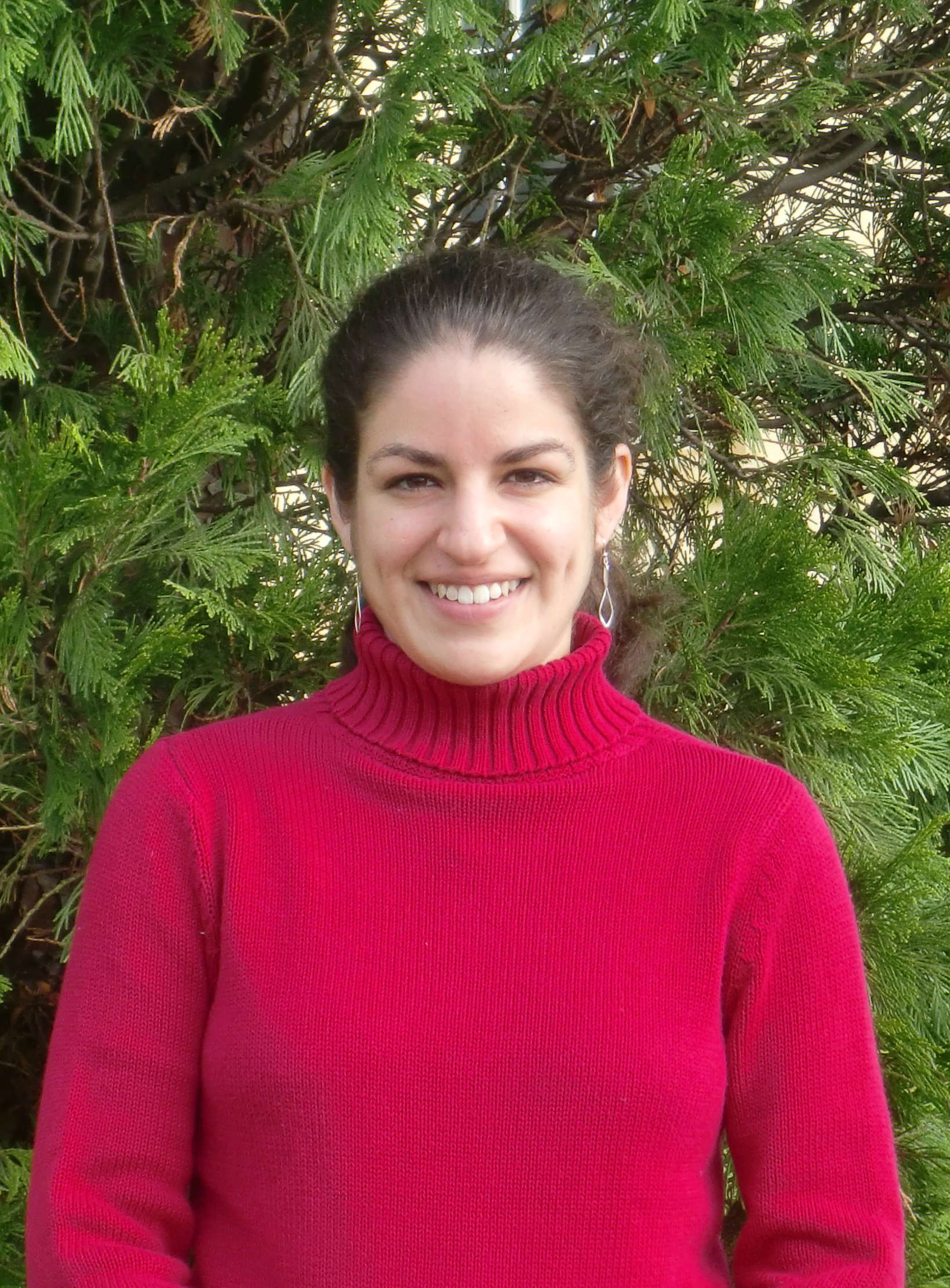![]() English version below / Vai alla versione italiana
English version below / Vai alla versione italiana
Mexico is a country full of colours, flavours and with climate ranging from the hot desert to the humid tropical rainforest. Mexican society is also characterised by many contrasting realities and only a small proportion of Mexicans have had the fortune to be in close proximity with the beauty of Mathematics. For most of us, the opportunity to enjoy maths came from talented teachers or encouraging families. However, ever since the first Mexican Mathematical Olympiad (OMM) took place in 1987, it has played a very important role in bringing kids closer to the subject.
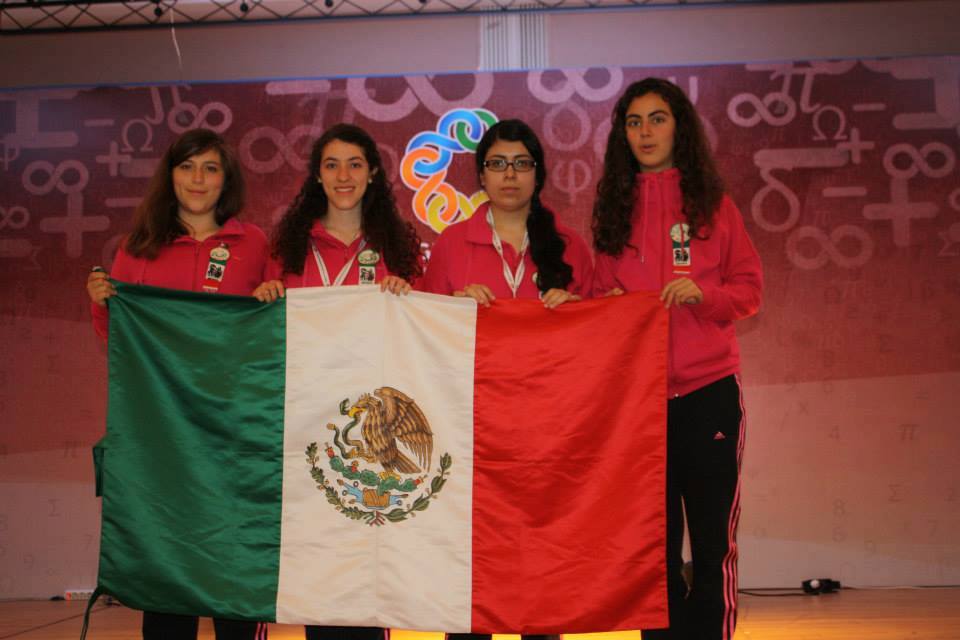
Mexican Team at EGMO 2014
On the other hand, the gender gap in STEM areas is also evident in the country: in two of the largest universities which offer a degree in Mathematics in Mexico City, the proportion of women with tenure or tenure track positions in these fields currently ranges between 14% and 34%. Furthermore, this gap has even made its way to the youngest cohort of future mathematicians.
One of the pillars encouraging girls interested in maths is Prof. Isabel Hubard, from the Mathematical Institute at the National Autonomous University of Mexico (UNAM), who has been the team leader for the girls going to EGMO since 2015. Her area of expertise is Discrete Geometry. Isabel was herself a gold-medalist of the Mexican Mathematical Olympiad when she was in high school. Although this was not so long ago, back then there were still not so many international maths competitions. The Central-America Mathematical Olympiad first took place in 1999 and, since then, the good performance of Mexico in international contests has consolidated as an important goal for the organisers of the local contests.
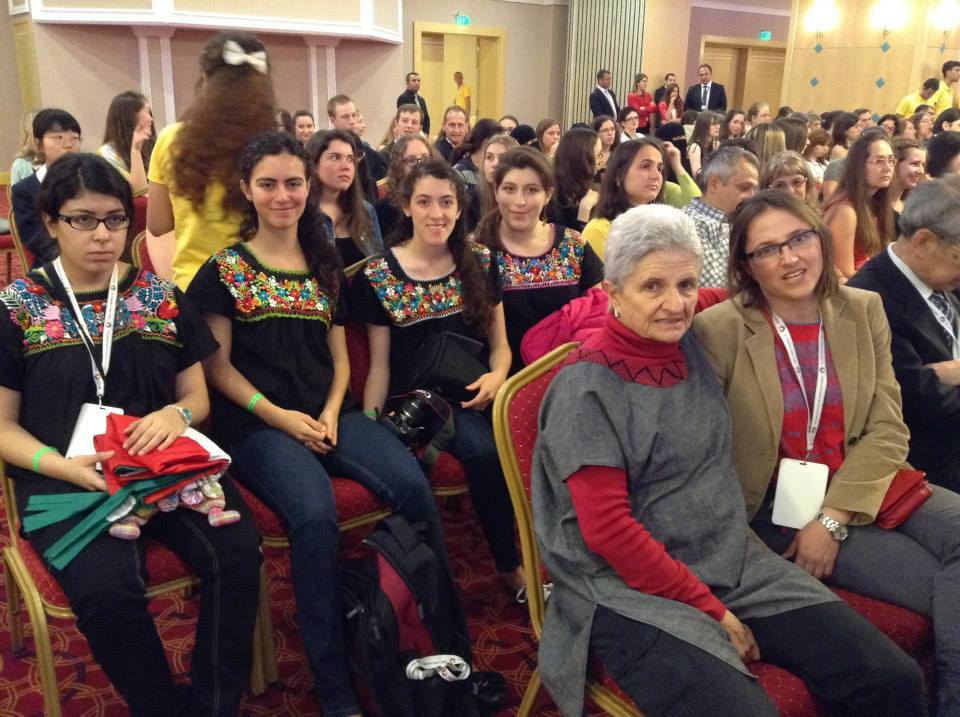
Mexican Team at EGMO 2014
Mexico at EGMO and EGMO for Mexico
Mexico first participated as a guest country in EGMO in 2014. That year, the team leaders were Ana Rechtman and Radmila Bulajich. There were three bronze medals for our participants that time and the beginning of a new project to bring more girls close to maths in the country.
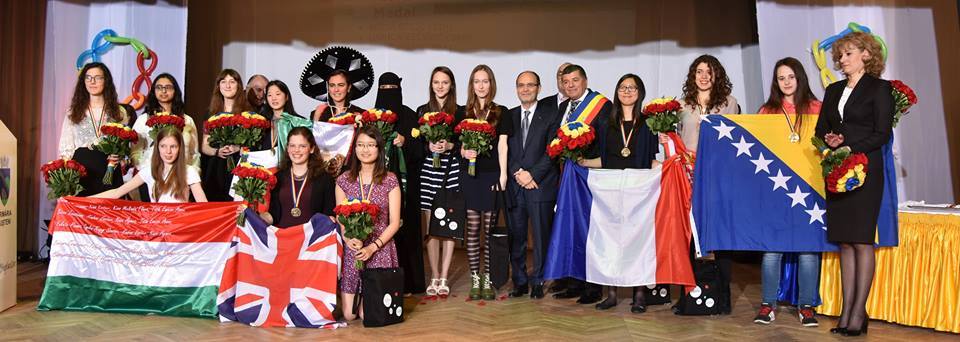
Olga and the other gold medalists at EGMO 2016. Can you spot her?
For Isabel Hubard there is no doubt that, “the more girls participate in the training sessions [for the olympiad], the more girls stay until the final stage”. This, she explains, has to do with the strong support that the girls give to each other: they work in teams consistently and they stay more focused this way. Besides, they encourage each other to keep going.
For Isabel and the people behind the local contests, it is also encouraging that 2017 has clearly been the year with the most girls participating in the National Olympiad (OMM) with remarkable performance.
This is in contrast to previous years where there was a disparity between the percentage of girls participating and the percentage of girls who did well. This, Isabel explains, is partly a consequence of a positive feedback where girls aiming to participate at EGMO receive further training, which results in them doing better in other competitions.
EGMO has certainly had a positive effect for the girls in Mexico. However, for Isabel and the other team leaders, it is clear that it is essential to continue the hard work to maintain the good results, both in reducing the gender gap from this young age already and in obtaining more medals for Mexico.
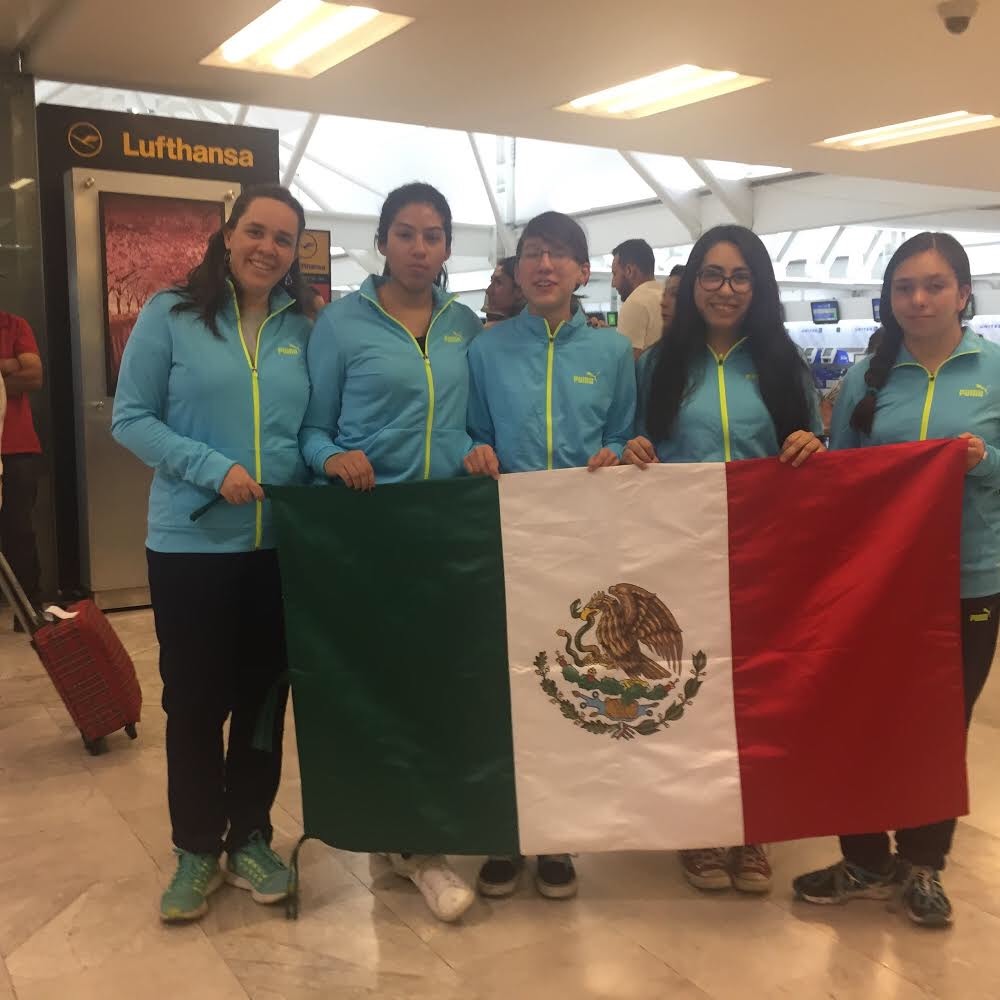
Team Mexico arriving in Zürich for EGMO 2017
The Mexican participants
The enthusiasm of the four girls who attended EGMO 2017 is contagious and they shared some of their thoughts and experiences with us.
Nuria Sydykova will soon begin her last year of high school. Born in Germany, she moved to Mexico City at a very young age. She first participated in a regional mathematical olympiad when she was 12 years old and, in her words: “the olympiads are now a very important part of my life”. She told us how significant it is that she has met people from all over the country and even from beyond our borders thanks to Mathematics. Furthermore, she notes that what she has learned at the training sessions for the olympiads has helped her to appreciate mathematics, physics and other sciences she studies at school in more depth. For Nuria, participating in the EGMO and other contests has given her invaluable tools and also strong bonds of friendship. She won a bronze medal at EGMO 2017 and she will participate in EGMO 2018 where, in addition to great results, she expects her overall experience in Florence to be wonderful.
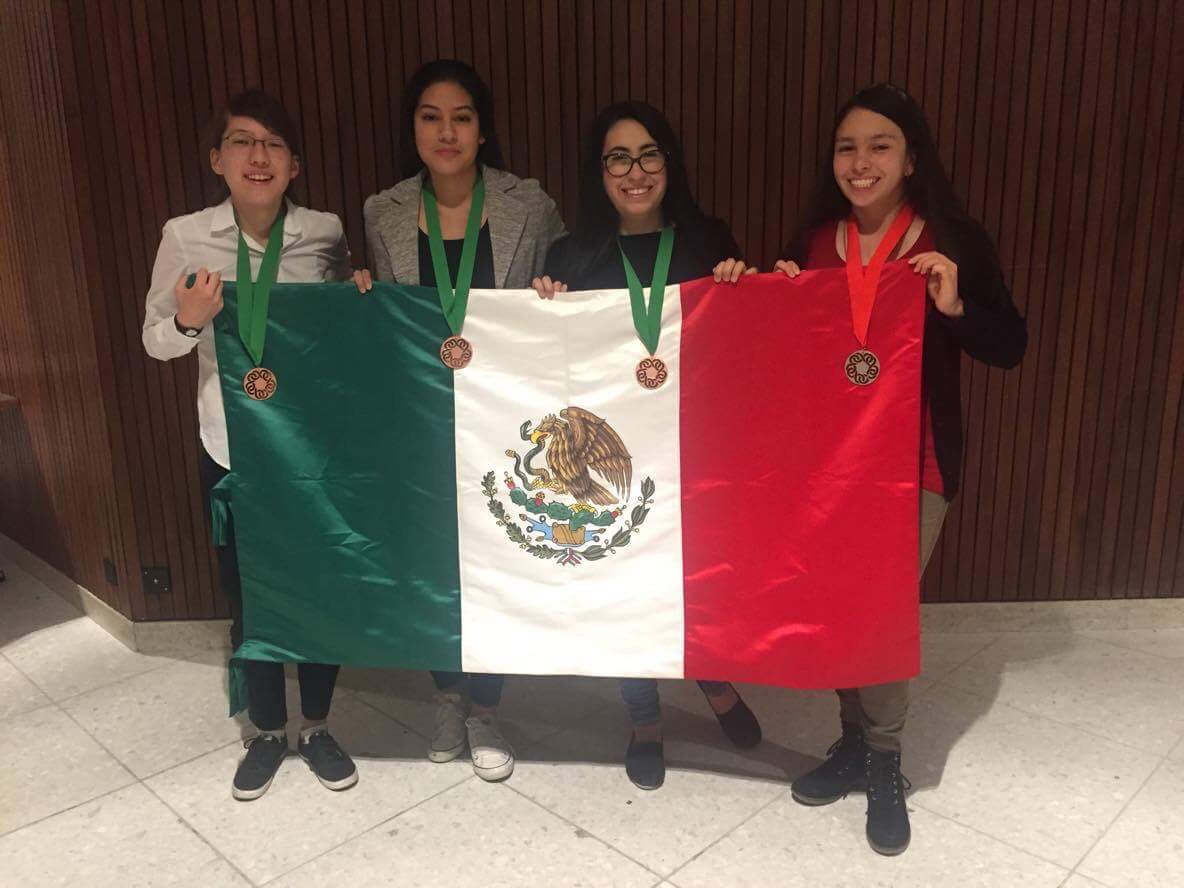
Mexico at EGMO 2017
Marcela Cruz was born in the southern state of Tabasco, but moved to Mexico City for her last year of high school studies. In her decision to move, she was also motivated by the training she receives for EGMO and other maths contests, which currently takes place in the capital. She first participated at a regional maths olympiad when she was still in junior high school. Most of the other contestants were more senior than her and her mother’s encouragement helped her to continue to the next stages, until she reached the National contest. For Marcela, participating in the olympiad has been a wonderful experience because of the good friends she has made, in addition to all the people and places she has met across the country. She expects to begin pursuing a degree in Mathematics in Mexico later in August, but first she will also attend EGMO in Florence. Marcela is convinced that, as she says, “the olympiads have helped me find skill and joy for Mathematics in myself”. Furthermore, she appreciates that the training she received for EGMO was decisive for her good performance in other competitions. She participated in EGMOs 2016 and 2017, obtaining a bronze medal at the latter one. Marcela is convinced that it is crucial to promote curiosity and interest in science to girls and boys equally, because when “you realise that you like something, you work hard on it and you do it with passion. Then you obtain good results.”
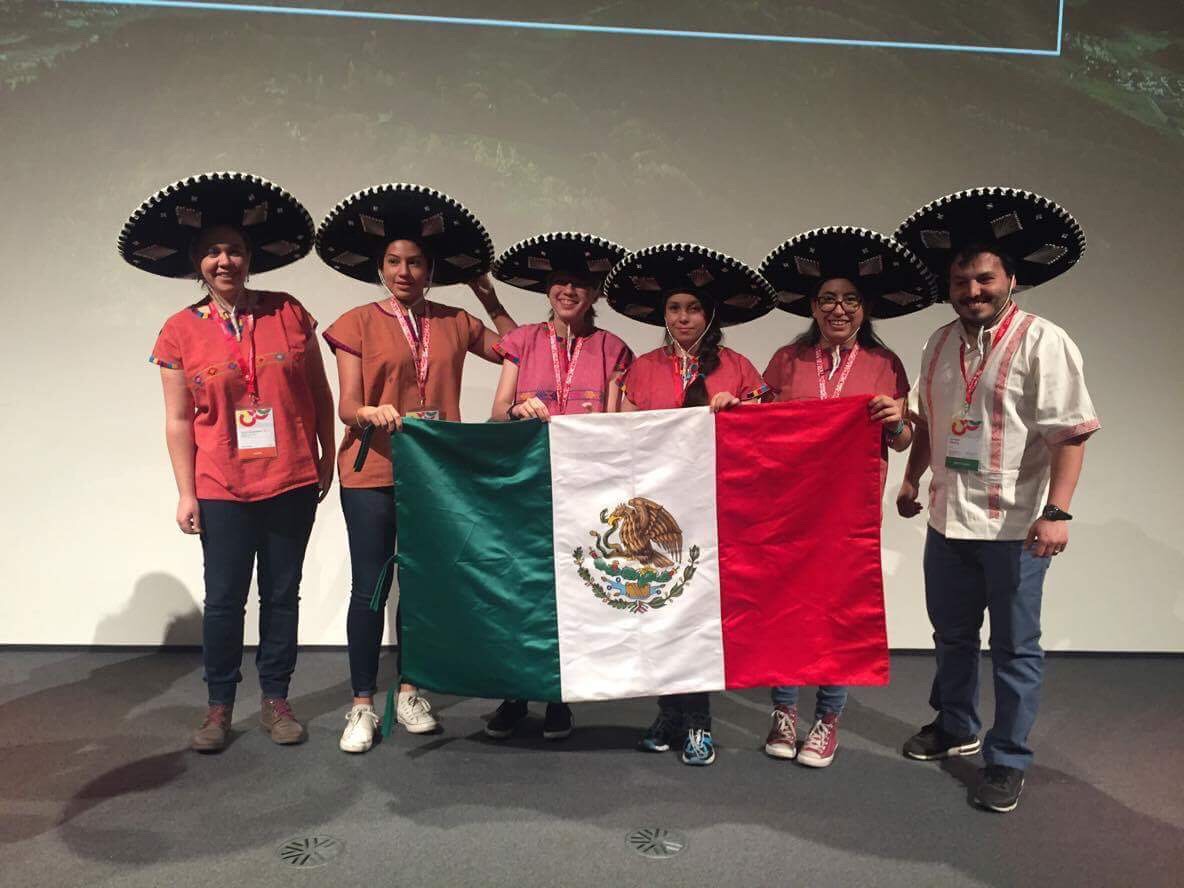
Mexico and its medals at EGMO 2017
Ana Paula Jiménez, born in Mexico City, began participating in maths olympiads when she was in 1st year of junior high school. The youngest one of the Mexican Delegation at EGMO 2017, she looks up to her fellow friends participating and to Isabel Hubard. They are role models for her and a motivation to do well. She has found very good friends following her participation in different maths contests and she appreciates that she learned about her passion to solve maths problems while training for the olympiads. Furthermore, she feels that it is more enjoyable when there is a balance between girls and boys participating in the contests. Ana Paula is also fond of artistic disciplines and right now she hopes to pursue a degree where she can combine her interest in maths and arts. However, first she will focus on training for EGMO 2018, where she will work hard to obtain a very good result, after having already won a silver medal in last year’s competition. Ana Paula mentioned that “it is important for the younger girls entering the olympiads to never give up, be persistent and work consistently hard to obtain the results they want”.
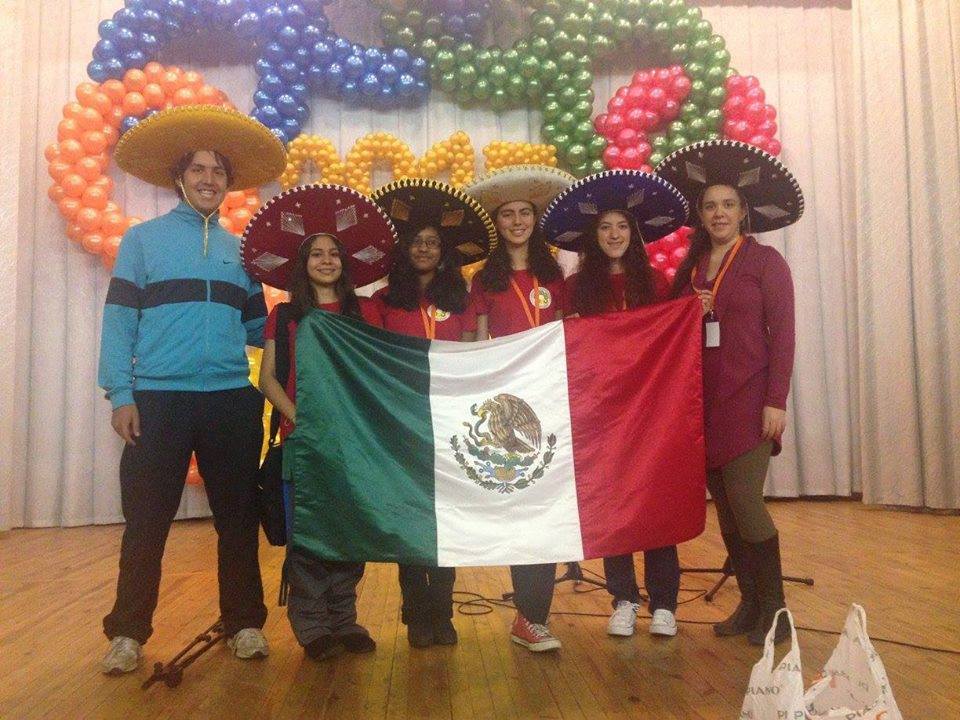
Mexico at EGMO 2015
Cristina Sotomayor, originary from Mexico City, began taking part in the olympiads when she was in 2nd year of junior high school. Ever since then she has been training and participating in different contests. She has always found fun to learn new things on different topics. Cristina attended EGMO 2017 and, in addition to winning a bronze medal, she enjoyed an environment with more girls sharing her interest in maths. She expects to keep herself involved with the olympiads by continuing to train younger kids, which she has been doing for the past two years. Cristina reflects on how “people often think that there is no creativity involved in maths. However, when you get more into it, you discover how essential creativity is to solve problems”. She also enjoys to see how, by learning maths, one also learns to make connections between different fields and develops creativity and reasoning skills that are useful for everything else. Cristina is now in her final year of high school and she expects to begin studying a degree in Mathematics later this year. In sharing her experiences, she also thinks that it is important for the younger girls entering the world of the olympiads, not to be intimidated by how older ones, who have been training for longer, have more developed skills. “Each stage is different and so, if they enjoy it, with hard work they will get better each time”. Cristina is convinced that it is important to take the best of each part of the process and that this is not only about the competition itself, but about what you learn and the friends you make.
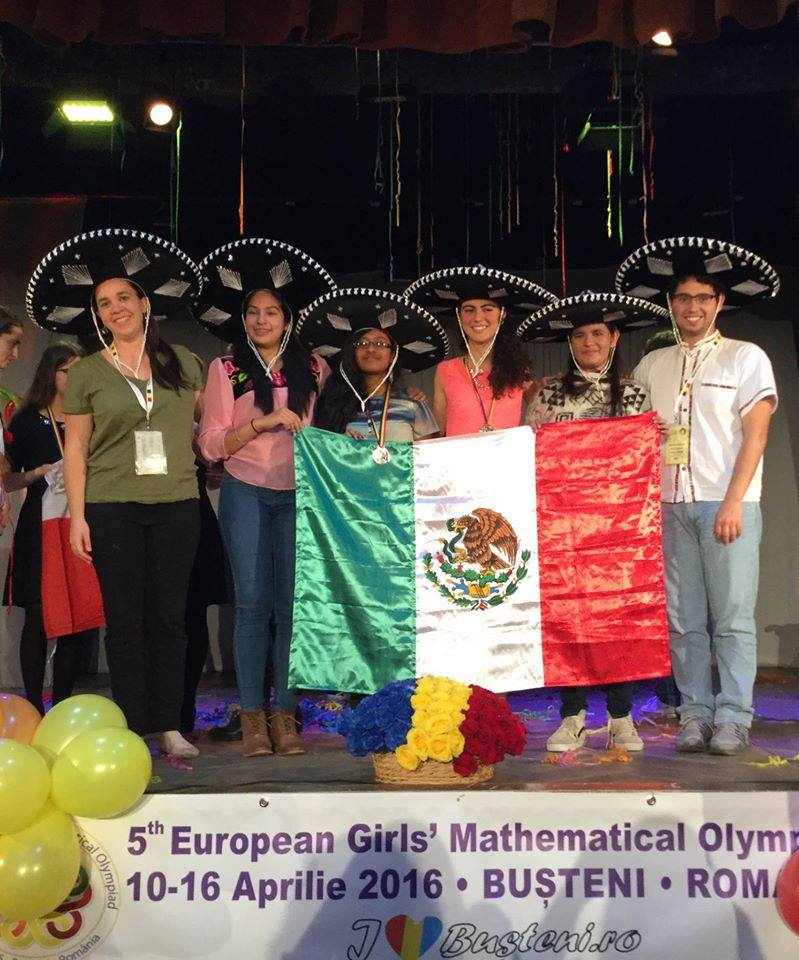
Mexico at EGMO 2016
This year, Nuria Sydykova, Marcela Cruz, Ana Paula Jiménez and Violeta Martínez will represent Mexico at EGMO in Florence. To all of them and to all the past participants, we wish a smooth path to success and a brilliant future, as well as a wonderful experience together with their committed leaders: Isabel Hubard and Enrique Treviño.
The rest of us must continue to work hard and actively pave the way for the future Mexican mathematicians and scientists, so that each day we get closer to providing equal initial conditions and a robust support system for all of them, independently of their gender or economic background. The road ahead is extremely long, so we must take one step at a time. “EGMO is not the solution to the gender problem in maths, but it definitely has provided us with achievements in that matter”, says Isabel Hubard. We certainly hope it will continue to do so and we thank our European hosts for the space they offer to develop their skills, to those pursuing to reach deeper into Mathematics.
![]() Versione italiana a seguire / Back to English
Versione italiana a seguire / Back to English
Il Messico è una nazione piena di colori e sapori, con un clima che varia dal deserto torrido all’umidità della foresta pluviale. Anche la società messicana è caratterizzata da molte realtà in contrasto le une con le altre e solamente una piccola porzione di Messicani ha avuto la fortuna di entrare in contatto con la bellezza della matematica. Per la maggior parte di noi l’opportunità di apprezzare la matematica è arrivata grazie a insegnanti particolarmente bravi o alle famiglie che ci hanno sostenuto. Le Olimpiadi Messicane di Matematica (OMM) tuttavia giocano fin dalla loro prima edizione nel 1987 un ruolo assai importante nell’avvicinare i ragazzi alla materia.

La squadra messicana alle EGMO 2014
Al contempo, anche la disuguaglianza di genere nel mondo STEM è evidente in Messico: in due delle più grandi università di Città del Messico che offrono un corso di laurea in Matematica, la proporzione di donne con una posizione a tempo indeterminato o “tenure track” in questo settore è attualmente tra il 14% e il 34%. Non solo, questa disuguaglianza si è fatta largo anche tra i giovani futuri matematici.
Una delle colonne portanti nel sostenere le ragazze interessate alla matematica è la prof.ssa Isabel Hubard, dell’Istituto di Matematica dell’Università Nazionale Autonoma del Messico (UNAM), che è stata Team Leader della squadra messicana alle EGMO fin dal 2015. La sua area di ricerca è la Geometria discreta. Isabel ha vinto una medaglia d’oro alle Olimpiadi Messicane di Matematica, quando era studentessa al liceo. Nonostante non sia passato troppo tempo, allora non c’erano ancora molte gare internazionali di matematica. Le Olimpiadi Centro-americane di Matematica si sono svolte per la prima volta nel 1999 e, da allora, l’ottenere buoni risultati alle gare internazionali si è pian piano consolidato come un importante obiettivo per gli organizzatori delle gare locali messicane.

La squadra messicana alle EGMO 2014
Il Messico alle EGMO e le EGMO per il Messico
Il Messico ha partecipato per la prima volta alle EGMO nel 2014, come nazione ospite. I Team Leader di quell’anno erano Ana Rechtman e Radmila Bulajich. Le partecipanti rientrarono con tre medaglie di bronzo e quell’evento segnò l’inizio di un nuovo progetto nazionale per avvicinare più ragazze alla matematica.

Olga e le altre medaglie d'oro alle EGMO 2016. Riuscite a trovarla?
Per Isabel Hubard non c’è dubbio che “quante più ragazze partecipano agli allenamenti [olimpici], tante più ragazze rimarranno fino alla fase finale.” Questo, spiega, dipende anche dal grande sostegno che le ragazze si danno l’un l’altra: lavorano regolarmente in gruppi e questo le aiuta a rimanere più concentrate. Non solo, si incoraggiano a vicenda a tener duro e andare avanti.
Per Isabel e le altre persone coinvolte nelle gare nazionali è estremamente incoraggiante che il 2017 sia stato l’anno con la massima partecipazione femminile alle Olimpiadi Messicane di Matematica, con risultati ragguardevoli.
Questo è in contrapposizione con gli anni precedenti, dove c’era una grande differenza tra la percentuale di ragazze partecipanti e quella di ragazze con buoni risultati. Questo, spiega Isabel, dipende in parte da un circolo virtuoso nel quale le ragazze che puntano a partecipare alle EGMO hanno accesso ad ulteriori allenamenti, che permette loro di far meglio anche nelle altre competizioni.
Le EGMO hanno certamente avuto un effetto positivo per le ragazze messicane. Tuttavia è chiaro per Isabel e gli altri leader che è cruciale proseguire con questo sforzo per confermare i buoni risultati, sia nel ridurre le disuguaglianze di genere fin dalla giovane età, sia nell’ottenere ulteriori medaglie per il Messico.

La squadra del Messico appena arrivata a Zurigo per le EGMO 2017
Le partecipanti messicane
L’entusiasmo delle quattro ragazze che hanno preso parte alle EGMO 2017 è contagioso: hanno voluto condividere con noi le loro riflessioni ed esperienze.
Nuria Sydykova inizierà a breve il suo ultimo anno di superiori. Nata in Germania, si è trasferita molto presto a Città del Messico. Ha partecipato per la prima volta ad una gara locale delle Olimpiadi di Matematica quando aveva 12 anni e, nelle sue parole: “le olimpiadi sono ora una parte molto importante della mia vita”. Ci ha detto quanto sia significativo aver incontrato persone da tutto il Messico e anche da oltreconfine grazie alla matematica. Ha osservato, inoltre, che quanto ha imparato negli allenamenti olimpici l’ha aiutata ad apprezzare più a fondo la matematica, la fisica e le altre scienze presentate a scuola. Secondo Nuria l’aver partecipato alle EGMO e ad altre gare le ha dato non solo strumenti inestimabili, ma anche forti legami d’amicizia. Alle EGMO 2017 ha vinto una medaglia di bronzo e parteciperà alle EGMO 2018 da cui si aspetta, oltre ad un buon risultato, di vivere una meravigliosa esperienza.
\

Il Messico alle EGMO 2017
Marcela Cruz è nata nello stato meridionale di Tabasco, ma si è trasferita a Città del Messico per l’ultimo anno di scuola superiore. In parte il suo trasferimento è stato anche motivato dagli allenamenti per le EGMO e per le altre gare di matematica cui partecipa, che attualmente si tengono nella capitale. Ha preso parte ad una gara locale delle Olimpiadi di Matematica quando era ancora alle scuole medie. Gli altri partecipanti erano in maggioranza più grandi di lei, ma grazie al sostegno di sua madre è passata alle fasi successive, fino a raggiungere la gara nazionale. Per Marcela prender parte alle olimpiadi è stata un’esperienza meravigliosa, per via delle buone amicizie che ha stretto, oltre al gran numero di persone e posti che ha conosciuto in tutto il Messico. Pensa di iscriversi ad un corso di laurea in matematica in Messico il prossimo agosto, ma prima anche lei sarà a Firenze per le EGMO. Marcela è convinta che, come racconta lei stessa, “le olimpiadi mi hanno aiutata a trovare in me stessa abilità e gioia per la matematica”. Inoltre si rende conto che l’allenamento ricevuto in preparazione alle EGMO è stato decisivo per i suoi buoni risultati in altre competizioni. Ha preso parte alle EGMO 2016 e 2017, vincendo una medaglia di bronzo in quest’ultima. Marcela è convinta che sia determinante stimolare interesse e curiosità per le scienze tanto nelle ragazze quanto nei ragazzi, perché quando “ti rendi conto che qualcosa ti piace, ti ci impegni e lo fai con passione. E ottieni buoni risultati.”

Il Messico e le sue medaglie alle EGMO 2017
Ana Paula Jiménez, nata a Città del Messico, ha iniziato a prender parte alle Olimpiadi di Matematica quando era al suo primo anno di scuola media. È stata la più giovane della squadra messicana alle EGMO 2017 ed è piena di ammirazione per le sue amiche compagne di squadra e per Isabel Hubard. Per lei sono fonte d’ispirazione e motivazione a far bene. Ha trovato molti buoni amici in seguito alla sua partecipazione a svariate gare di matematica e riconosce di aver capito a fondo la propria passione per la soluzione di problemi di matematica mentre si allenava per le olimpiadi. Allo stesso tempo, pensa che un equilibrio tra ragazzi e ragazze nella partecipazione alle gare le renda più divertenti. Ana Paula è anche appassionata di arte e spera di poter seguire un percorso universitario che le permetta di combinare questa sua passione con quella per la matematica. Ad ogni modo prima di ciò si concentrerà sull’allenarsi per le EGMO 2018, dove si impegnerà per ottenere un ottimo risultato, dopo aver vinto la medaglia d’argento nella gara dello scorso anno. Ana Paula ha sottolineato che “è importante, per le ragazze più giovani che si affacciano al mondo delle olimpiadi, non mollare, essere tenaci e lavorare sistematicamente e duramente per ottenere i risultati che desiderano.”

Il Messico alle EGMO 2015
Cristina Sotomayor è di Città del Messico e ha iniziato il suo percorso olimpico il secondo anno di scuola media. Da allora ha continuato ad allenarsi e a partecipare a svariate gare. Ha sempre trovato divertente imparare cose nuovi su diversi argomenti. Cristina ha partecipato alle EGMO 2017 e, oltre a vincere una medaglia di bronzo, si è goduta un ambiente ricco di ragazze che condividevano il suo interesse per la matematica. Pensa di rimanere nel giro delle olimpiadi, continuando ad allenare i più giovani, cosa che ha già fatto negli ultimi due anni. Cristina riflette sul fatto che “le persone spesso pensano che non ci sia creatività, nella matematica. Invece, quando impari a conoscerla un po’ meglio, ti rendi conto di come la creatività sia essenziale nel risolvere problemi.” Le piace molto anche che nell’imparare la matematica, uno impara anche a fare collegamenti tra ambiti diversi, sviluppando creatività e capacità di ragionamento che sono utili per ogni altra cosa. Cristina frequenta ora l’ultimo anno di scuola superiore e pensa poi di iscriversi ad un corso di laurea in matematica. Nel condividere le sue esperienze, pensa che sia importante che le ragazze più giovani che entrano nel mondo delle olimpiadi non si lascino intimidire dal fatto che le ragazze più grandi, che si allenano da più tempo, abbiano più tecniche a loro disposizione. “Ogni stage è diverso, dunque, se si divertono, lavorando sodo miglioreranno volta per volta.” Cristina è sicura che sia importante prendere il meglio da ogni parte del processo e che non c’è solo la gara vera e propria, ma tutto ciò che si impara e le amicizie che si stringono.

Il Messico alle EGMO 2016
Quest’anno, Nuria Sydykova, Marcela Cruz, Ana Paula Jiménez e Violeta Martínez costituiranno la squadra del Messico alle EGMO di Firenze. A tutte loro, così come a tutte le concorrenti degli anni precedenti, auguriamo una rapida ascesa al successo e un futuro radioso, così come una splendida esperienza, assieme ai loro leader: Isabel Hubard e Enrique Treviño.
A noialtri non resta che continuare il duro lavoro e aprire la strada ai futuri scienziati e matematici messicani, cosicché ogni giorno ci avviciniamo al fornire pari condizioni iniziali e un solido sistema di sostegno per tutti, indipendentemente dal genere o dal contesto economico di provenienza. La strada da percorrere è lunghissima, quindi bisogna iniziare a fare un passo per volta. “Le EGMO non sono la soluzione al problema di genere in matematica, ma decisamente ci hanno dato risultati in merito”, dice Isabel Hubard. Certamente noi speriamo che continui a farlo e ringraziamo i nostri ospiti europei per l’occasione di miglioramento che offrono a coloro che cercando di andare più a fondo nella matematica.
